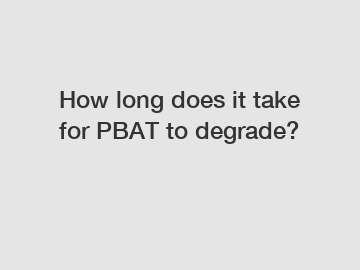How long does it take for PBAT to degrade?
How long does it take for PBAT to degrade?
Plastics have long been a major concern for environmentalists, as they are known to persist in the environment for hundreds of years. However, a breakthrough in biodegradable materials has brought hope for a more sustainable future. Polybutylene adipate terephthalate (PBAT) is one such material that has gained significant attention due to its ability to degrade. In this article, we will explore how long it takes for PBAT to degrade, the scientific evidence behind this phenomenon, and the implications and impacts it has on the environment.
PBAT is a biodegradable plastic that undergoes a natural degradation process when exposed to certain environmental conditions. The time it takes for PBAT to fully degrade depends on several factors such as temperature, moisture, and the presence of microorganisms. Studies have shown that PBAT can degrade within a range of three to six months in industrial composting facilities. These facilities provide the ideal conditions for the breakdown of PBAT, with controlled temperature, moisture, and a high concentration of microorganisms that can efficiently break down the material.

In natural soil environments, where the conditions are less controlled, PBAT degradation may take longer. It could range from six to twelve months or even more, depending on the specific conditions. The presence of sufficient moisture and oxygen accelerates the degradation process, as it allows the microorganisms to thrive and effectively break down the PBAT. On the other hand, in environments with limited oxygen and moisture, such as landfills, the degradation process can be significantly slower.
The degradation process of PBAT begins with the activity of microorganisms, such as bacteria and fungi, which colonize the surface of the material and secrete enzymes that break down the polymer chains. This process, known as microbial degradation, leads to the fragmentation of PBAT into smaller molecules. Over time, these smaller molecules are further broken down by the microorganisms through a process called mineralization, where they are converted into simpler compounds that can be utilized by other organisms in the ecosystem.
The ability of PBAT to degrade relatively quickly compared to traditional plastics has significant implications for waste management and environmental conservation. As PBAT degrades, it reduces the amount of plastic waste that accumulates in landfills or pollutes our oceans. It also offers a more sustainable alternative for single-use plastic products, as it can be effectively composted and returned to the soil as organic matter. By utilizing PBAT-based materials, we can reduce our dependence on fossil fuel-based plastics and contribute to a more circular and environmentally friendly economy.
In conclusion, PBAT is a biodegradable plastic that can degrade within a range of three to six months in industrial composting facilities. In natural soil environments, the degradation process may take longer, depending on the conditions. The activities of microorganisms play a vital role in breaking down PBAT into simpler compounds, ultimately reducing plastic waste and contributing to a more sustainable future. The development and utilization of PBAT-based materials have significant implications for waste management and environmental conservation, offering an alternative that is more compatible with the principles of a circular economy.
For more biodegrade plastic bags, pbat material, compostable resininformation, please contact us. We will provide professional answers.
113
0
0


Comments
All Comments (0)